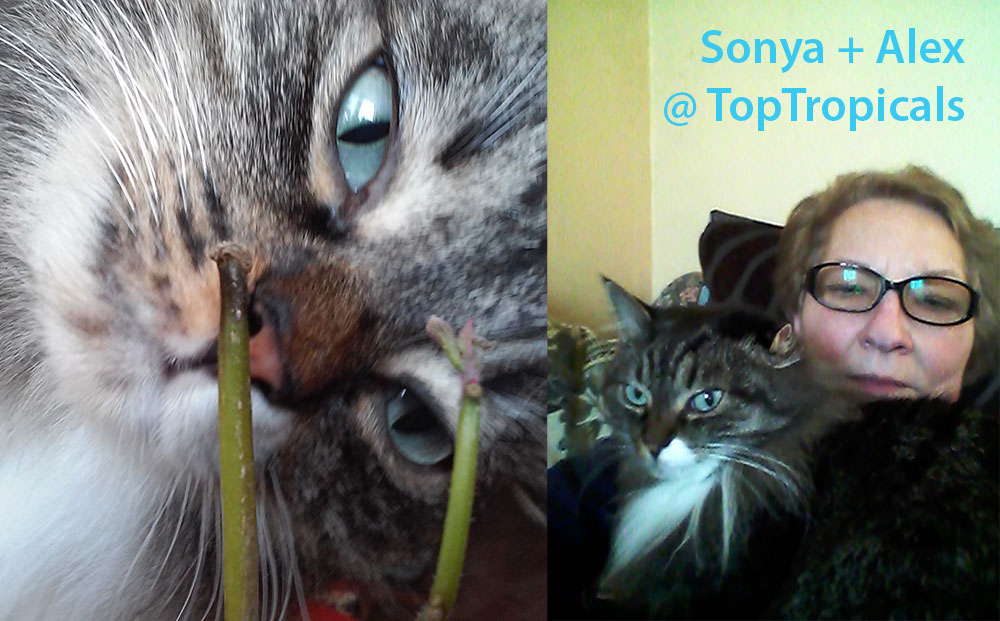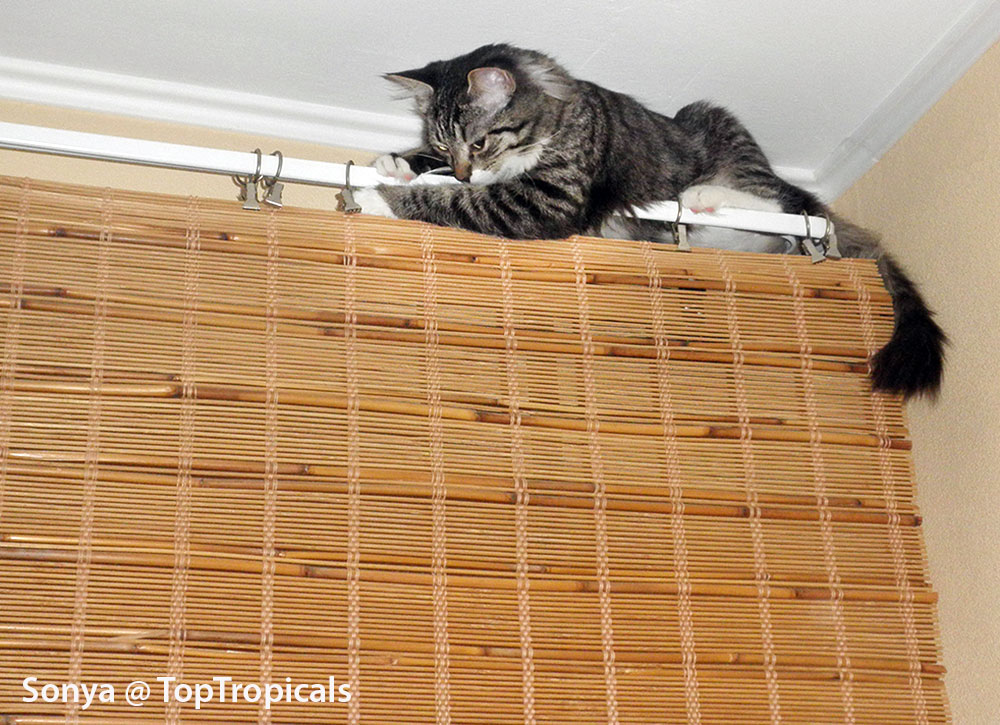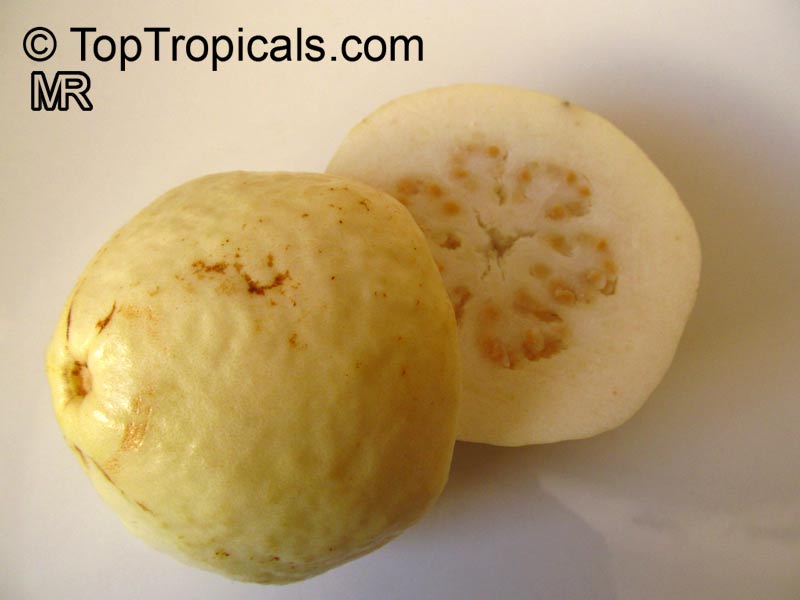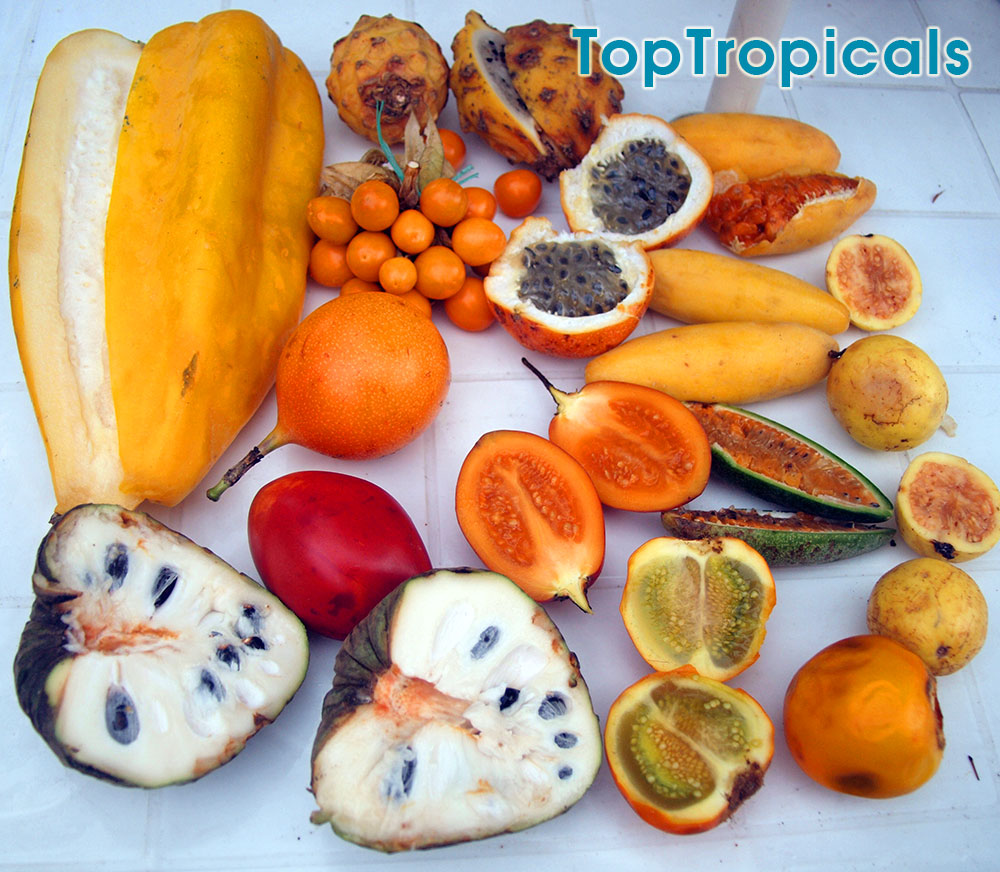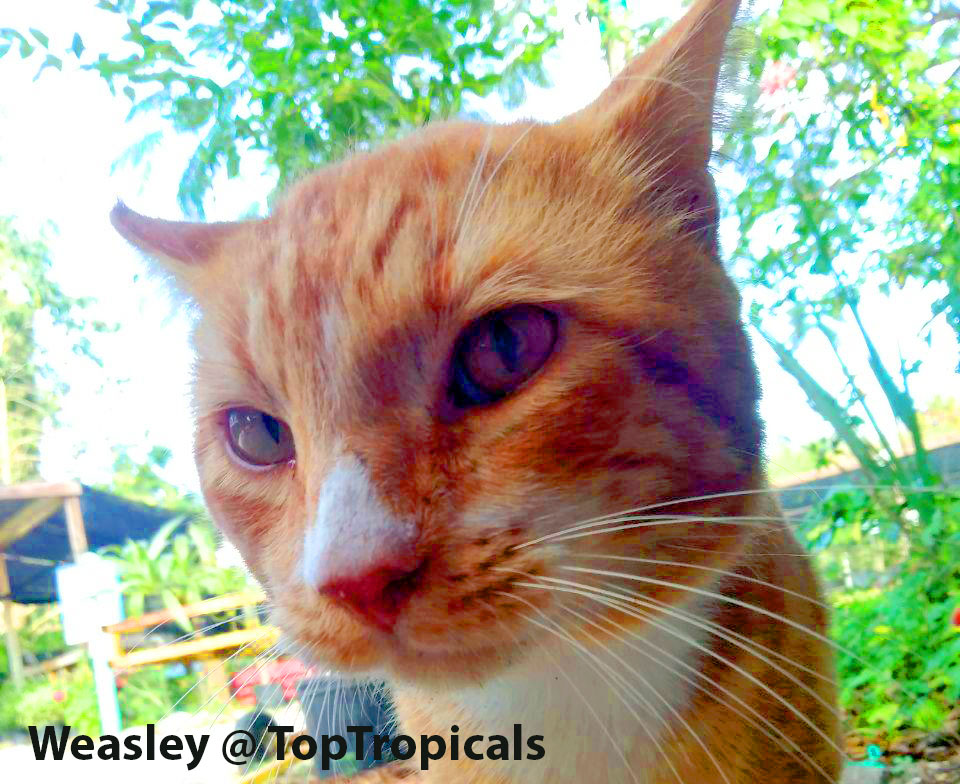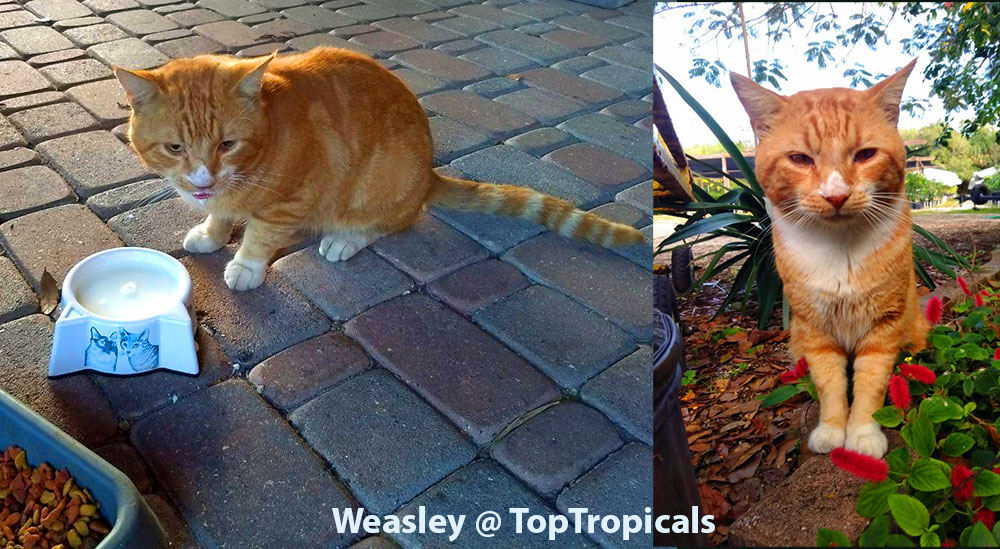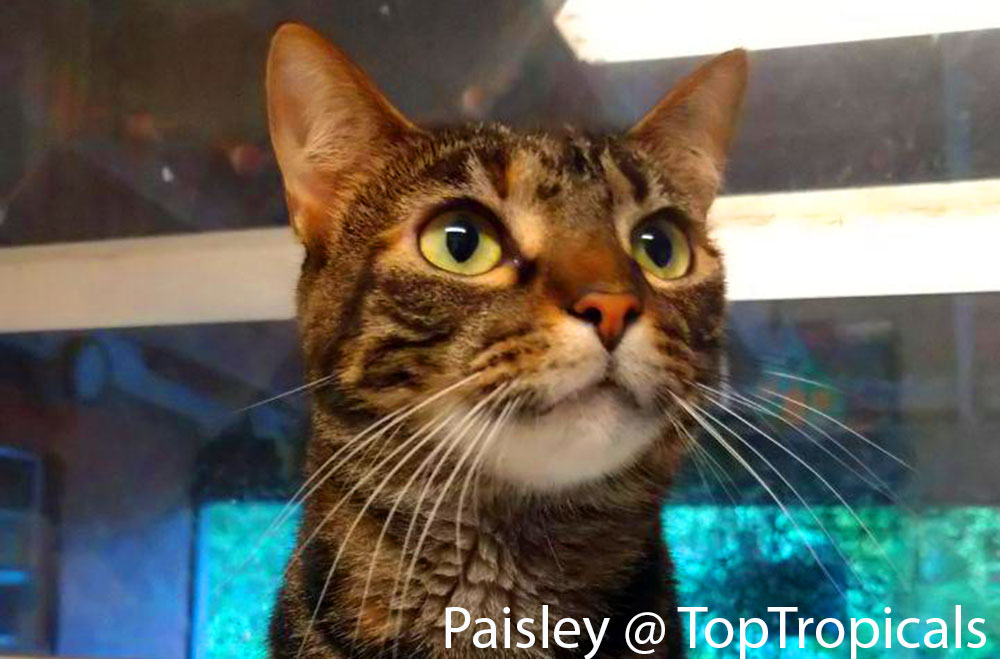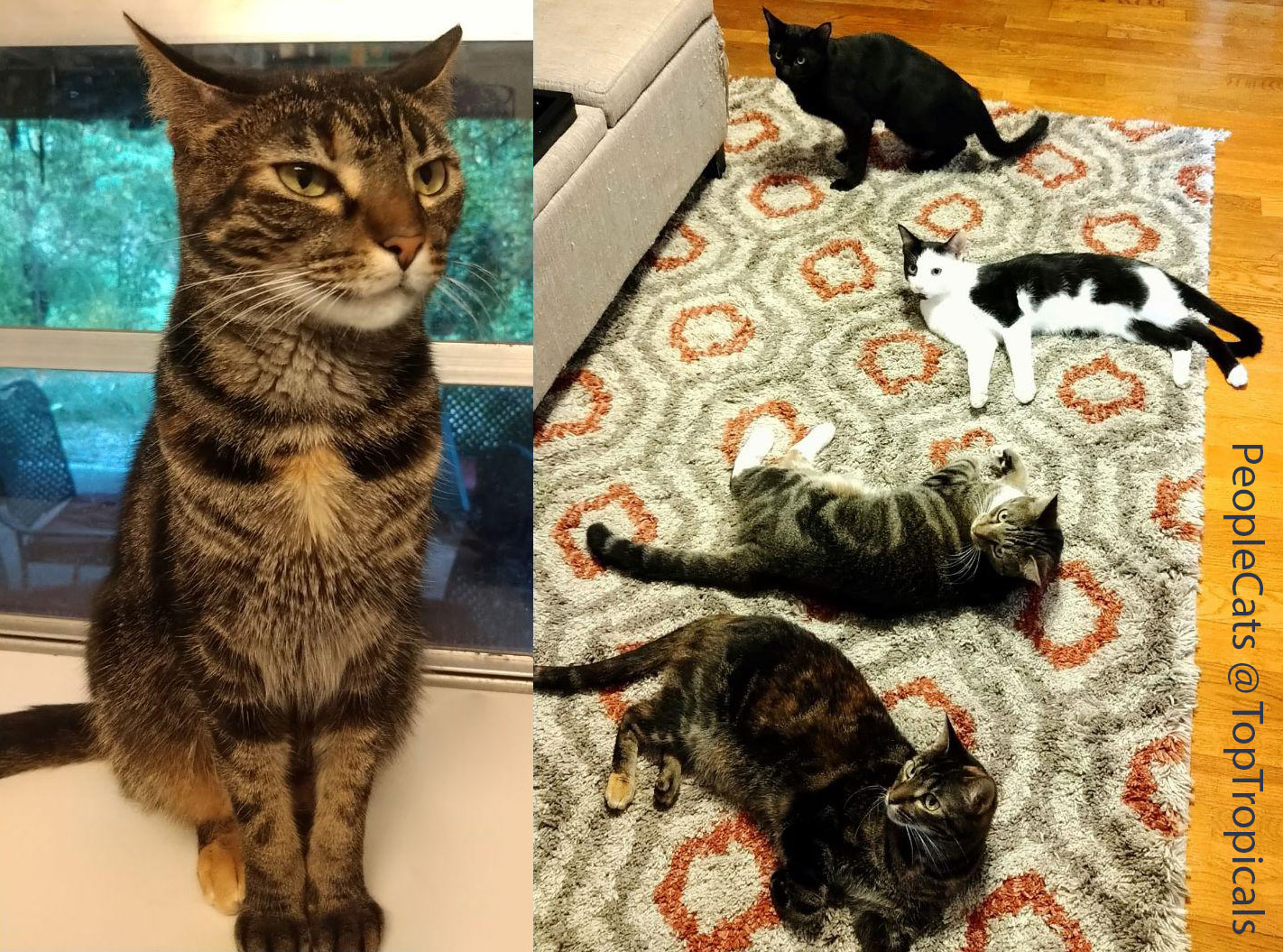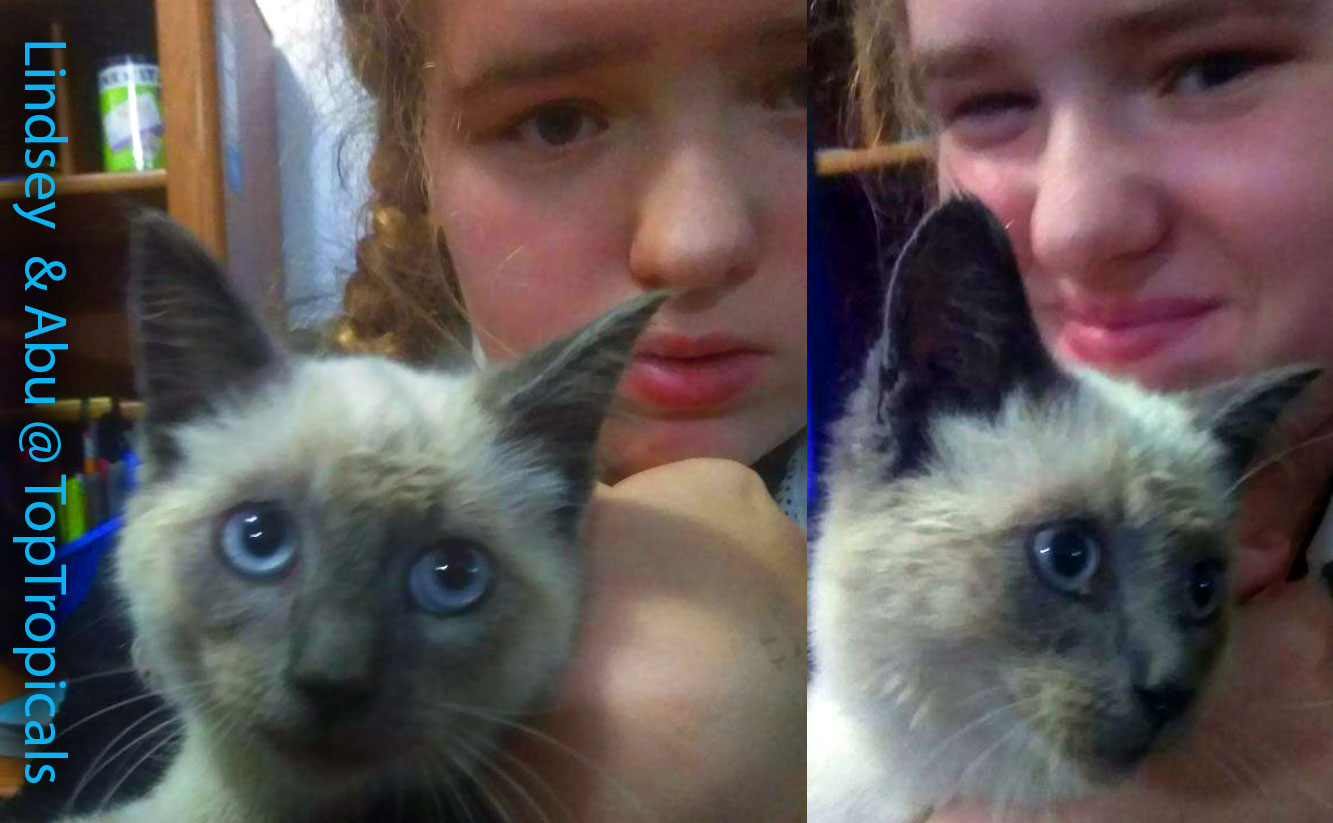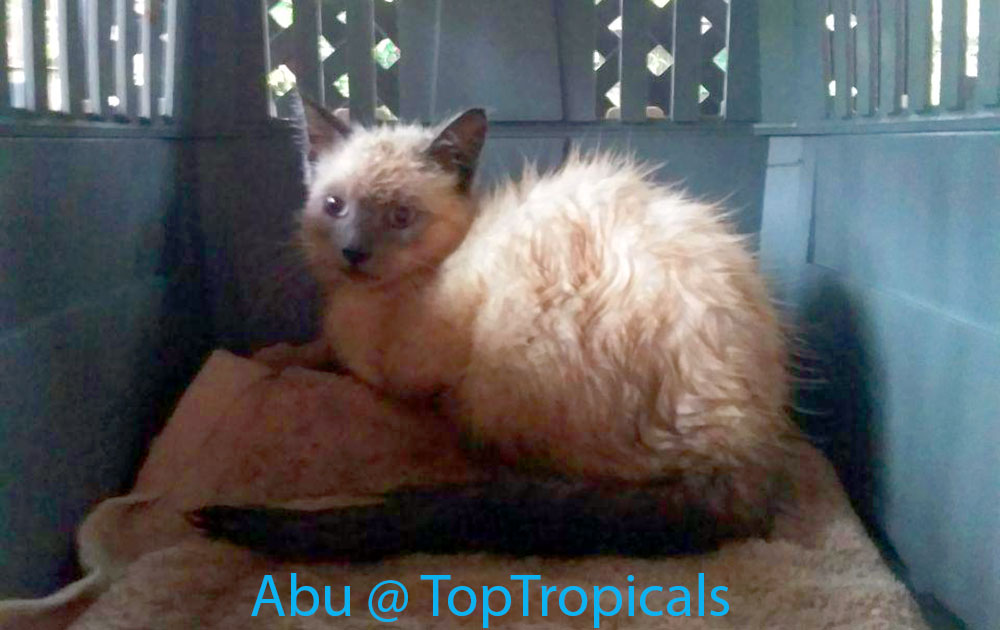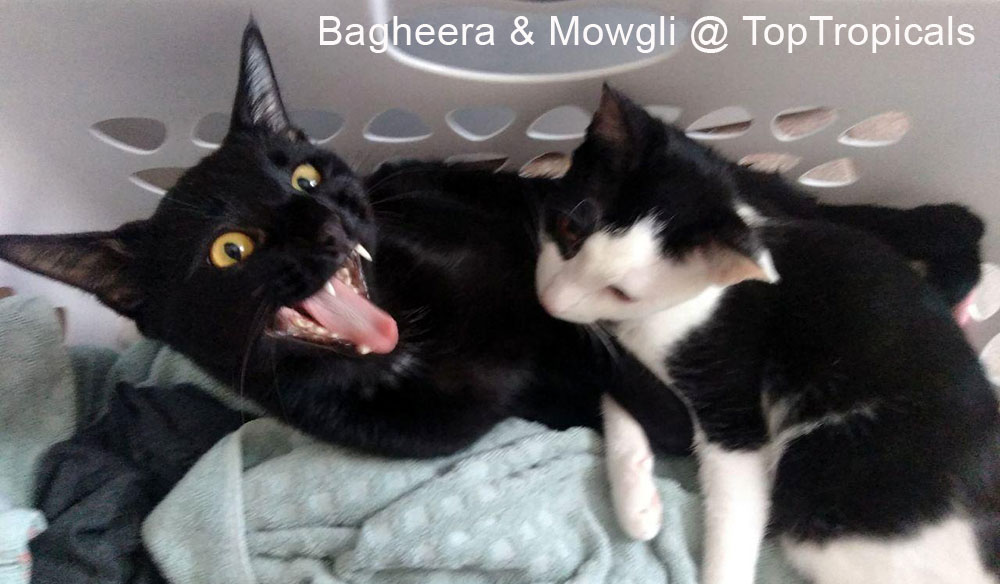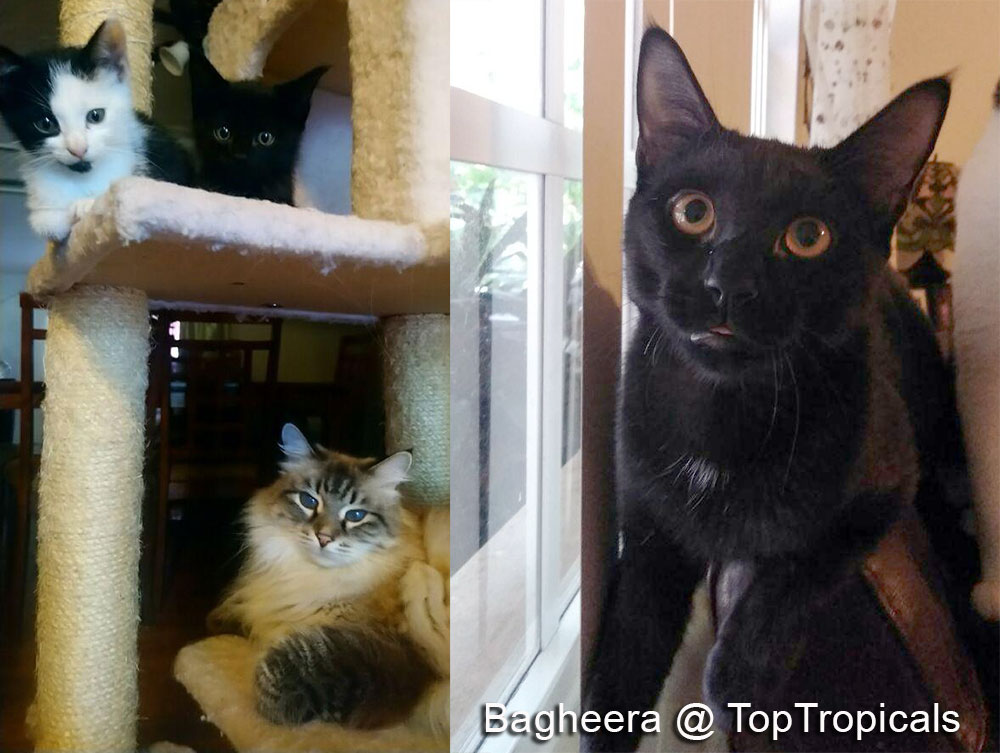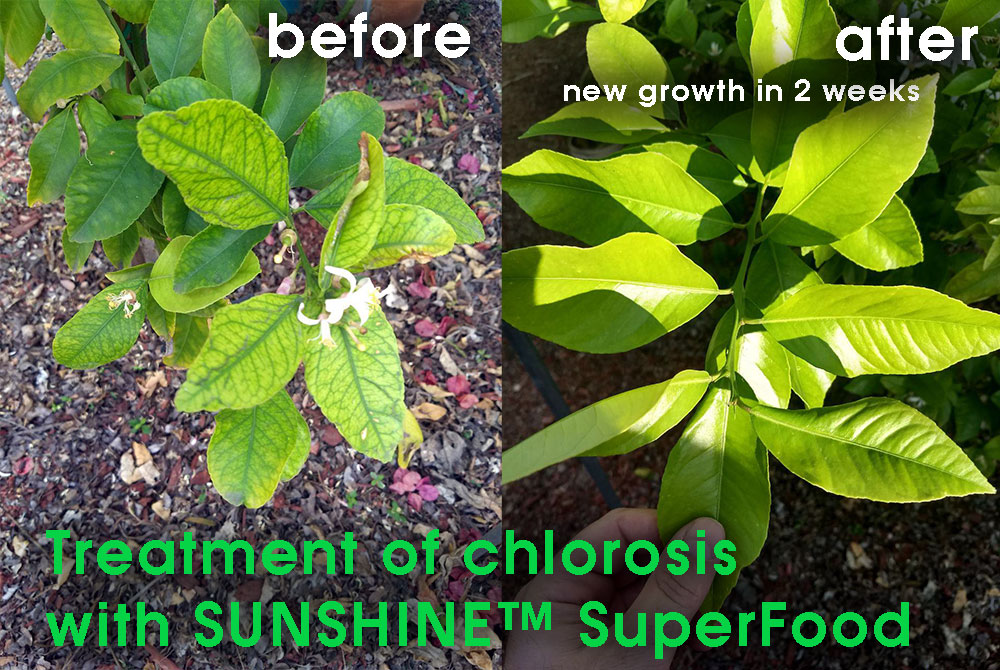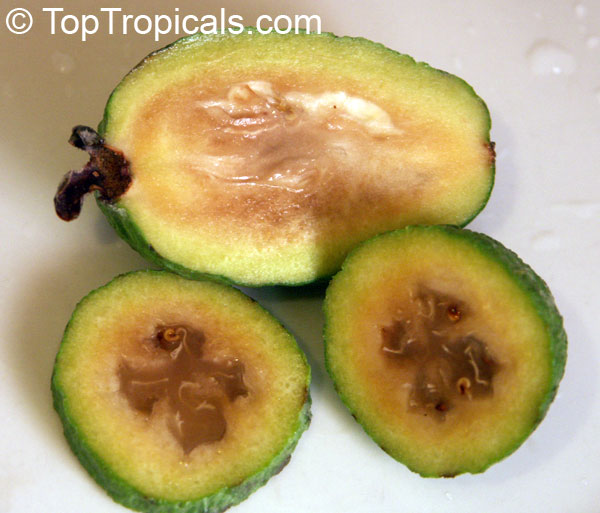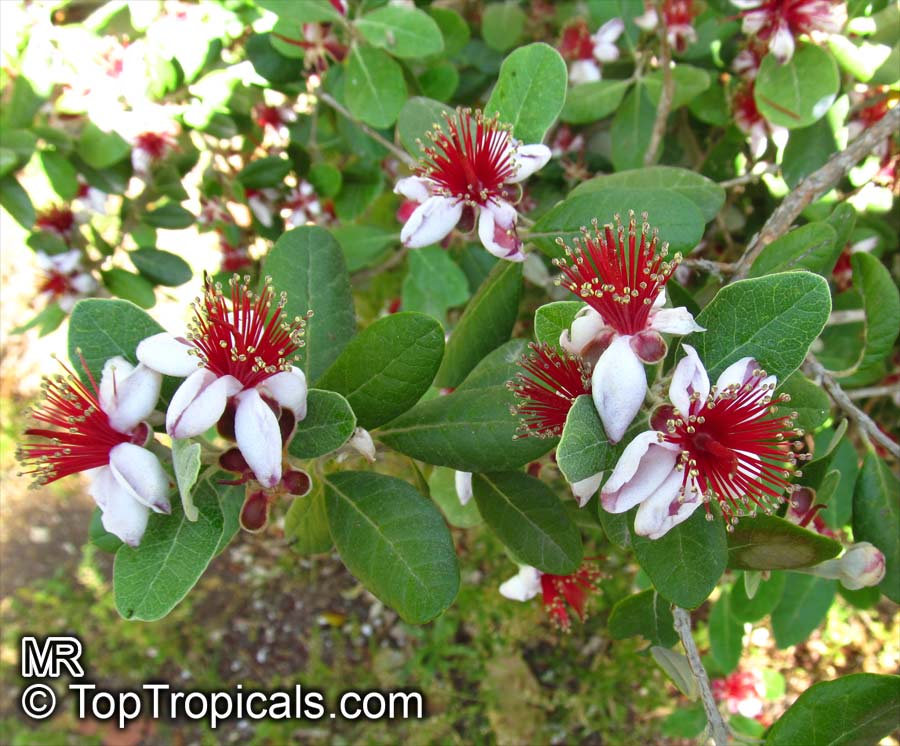Garden Blog - Top Tropicals
Date:
Meet PeopleCats of TopTropicals. Cat of the Day: Sonya, the Co-Author
In our previous newsletter, you met our editor/photographer tandem - Tilda & Marina. Today we introduce our columnist assistant - Sonya. For the past decade, this True Norwegian Forest Cat has been a great helper and inspirational co-author for Alexandra, TopTropicals website writer and social media blogger.
Alex has been with TopTropicals since Day One (2003). In 2011, she got Sonya, a 3-month old kitten that someone kicked out: at that young age she already had quite a temper of a real Wild Cat. No one wanted to adopt her and Sonya was doomed to suffer a street life... So Alex invited her in the house... and it took her many months to teach Sonya some good manners! And Sonya turned into a beautiful and affectionate Purrrson as well as became the Boss in the house (what a surprise, duh) and Alexandra's dearest life companion. Sonya also discovered her talent in writing plant stories for TopTropicals, sitting on Alex's shoulder and whispering into her ear while she is typing Sonya's horticultural tips. And when Alex stares at monitors for more than 5 hours, Sonya lays on her keyboard saying: "Now get up and get some stretch lady! Let's go re-pot some plants for a change!"
We will be following up on Sonya's creative work, and you will hear from her again soon...
Check out and more Cat of the Day stories.
Date:
Plants of Love. TopTropicals Webinars
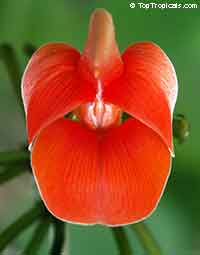
Plants of Love - Valentines Day Sale. For Valentines day, look beyond roses for a plant that will last a lifetime! It is not a surprise that the most popular plants that has been ordered from TopTropicals for Valentines day for the past 3 years, are: Vanilla, Chocolate, Grape, Strawberry tree, Rose apple - all things you get for your Valentines!
This year we are celebrating Valentines day with our special local event - "Aphrodisiacs, or Plants of Love".
When: Saturday, February 11, 2017, from 10 am to 2 pm
Where: Toptropicals Garden Center, 13890 Orange River Blvd, Ft Myers, FL 33905
Agenda:
10:00 am - Explore the grounds: Customers can come in to look through the nursery and guided tours through gardens.
12:00 pm - Aphrodisiac plants. Class on plants used for aphrodisiacs throughout history.
1:00 pm - Plant giveaway. Must be present to win one of the aphrodisiac plants in lecture.
2:00 pm - sale ends.
Special Love Discounts for local visitors! Snacks and drinks.
Just a few examples of the most famous plants of love that we will be talking about -
Coffea arabica - in East Africa and Arabia it was a sacred beverage to African sufis. For aphrodisiac results mix in cardamom and honey.
Banisteriopsis caapi, Ayahuasca - giant liana from tropical Amazon forests psychedelic, ritual inebriant that promotes potency. Drink is made from the bark and is taken in love rituals to revive the mythical past of the tribe.
Areca catechu, Betel Nut - seeds have stimulating effect on the entire body and eros. It's a traditional aphrodosiac in Ayurvedic medicine and is counted among the eight types of pleasure in the Brahmanic tradition. It has magical and religious properties and used as an offering to the Gods.
Theobroma cacao, Chocolate - mild stimulant, beans contain aphrodisiac. Antient Indian "recipe of chocolati" will be shared at the event! Cocoa was considered the "food of gods".
Cinnamon - in Southern Asia used as stimulant, in food or massage oil for erotic stimulation.
Cola nitida, Cola nut - used in love magic, was used as currency in W Africa.
Cananga odorata, Ylang-Ylang - increases eroticism with oil inhaled. Prescribed to treat impotency and frigidity.
Butea monosperma, Flame of The Forest - is traditionally used to manage male sexual disorders.
Mimosa pudica, Sensitive Plant - significantly increases the libido and hormonal levels of testosterone.
Satureja Viminea, Kama Sutra Mint Tree - used for love gel...
- and much more!
TopTropicals Webinars. Welcome to Top Tropicals Webinar! Discover the world of Rare Plants and surround yourself with a Tropical Paradise! Our plant experts will be answering your garden questions. Our next LIVE air time is just before Valentines Day - Saturday February 11, at 2 pm ET, with a topic of... of course, Aphrodisiac Plants! Get your questions ready!
Date:
Best tasting white guava
Q: What's your best tasting white guava?
A: Our favorite white Guava is Viet Nam variety that is also very rare and hard to find. The fruit is
very large, up to 6" in diameter, the pulp is very sweet and somewhat
crunchy.
The seeds are small which makes it more pleasurable to eat out of hand.
Another great feature of this variety, it stays compact and branches do not
get leggy, unlike most guavas. It can be easily grown in a container,
trimmed to the desired size and it will produce fruit under proper care.
Another cool variety is Indonesian, it also has a large round fruit and very few seeds to compare with others.
And last but not least, if you prefer soft fruit to crunchy, the Peruvian variety is a great choice. The fruit is pear-shaped.
Remember to provide plant food for good production, especially if grown in a container.
Fruit Festival Plant Food - Super Crop Booster
Mango-Food - Smart Release Fruit Tree Booster
SUNSHINE C-Cibus - Crop Nutrition Booster
Date:
When to fertilize and prune tropical fruit trees?
Q: Can tropical fruit trees (Soursop, Mango, Star fruit, etc) be given plant food any time of year? Also can they be trimmed this time of year/summer?
A: True tropical plants (including fruit trees) need plant food most of the year in real Tropics, where temperatures have very little fluctuations, and active growth season is close to 12 months a year. In subtropical areas when temperatures in winter drop below 65F, plant metabolism slows down, so it is recommended to fertilize only during the warmest period (March through November). So yes, Summer is the perfect time for fertilizing your trees; their metabolism is at the highest point and they can use more food!
Trim your fruit trees right after harvesting. Obviously, you don't want to prune branches before or during flowering or fruiting. The specific time of the year for pruning depends on the plant - every tree has its own flowering/fruiting season. However, avoid pruning right before winter: young shoots promoted by pruning are tender and can be cold damaged.
Recommended fertilizers for fruit trees:
Fruit Festival Plant Food - Super Crop Booster
Mango-Food - Smart Release Fruit Tree Booster
SUNSHINE-Honey - for sweeter fruit
SUNSHINE SuperFood - microelement supplement
Date:
Meet PeopleCats of TopTropicals. Cat of the Day: Weasley the Immigrant
Weasley came from the neighborhood cat community (our neighbor takes
care of at least a dozen of cats). Whether TopTropicals dry food tastes better
than neighbor's, or simply he is such an enthusiast of tropical gardening, he
hangs out with us all the time.
When you see him in our Garden
Center drinking milk or chilling right on the walkway with other
PeopleCats, don't get him confused with other two ginger cats we have: Barcy and Snitch... as well as the Russian Blue cat with a similar name Wesley...
Although Weasley currently has a status of a legal immigrant, he feels
pretty confident around our greenhouses and will be happy to give you a tour. He
is still a volunteer here but has already applied for a permanent residence
and a full time position, so his food needs are being added to our cat
payroll.
When visiting TopTropicals nursery, feel free to add your donation to a Cat
Jar located in our office by customer's computer. We appreciate everybody's
help - every penny goes to PeopleCat's needs.
Check out Video: Meet PeopleCats of TopTropicals and more Cat of the Day stories.
Date:
Meet PeopleCats of TopTropicals. Cat of the Day: Independent Paisley
Paisley is an independent cat that prefers to spend her time alone. She is Snitch's sister, both of them came to us two years ago from our co-worker Cindy (Purry's Mom). Even though Paisley is the smallest of Kristi's inside PeopleCats, she will make sure no food is wasted and finishes the other cats' food after they leave their bowls. She enjoys catching lizards when she gets outside time on the porch. Her excellent hunting skills would make her a great outdoor cat, but we are afraid she will become bird prey due to her small size.
Check out and more Cat of the Day stories.
Paisley likes hanging with the other cats if there's a rug involved!
Date:
Meet PeopleCats of TopTropicals. Cat of the Day: Lucky Abu
"You will always be lucky if you know how to make friends with
strange cats".
Colonial American Proverb
- our last Cat of The Day Itembi started with this quote... and guess what, it proved right again!..
Right around the corner from TopTropicals, in the woods, Kristi noticed
a skinny poor cat... she looked so miserable, just bones and skin... she
could hardly walk and looked injured. And yet she had 2 kittens following her!
The Cat Family could use some meal and a warm home. Unfortunately they seemed
to be feral and wouldn't let Kristi pick them up.
Compassionate Kristi spend couple days brainstorming how to save these poor
PeopleCats in need. She ended up setting a trap and... bingo! The first
Little Purrson found its forever sweet home at TopTropicals!
...The cat groomer Lindsey came home from school. First bath time... the
kitty smelled like poop! Soon the bath time was over... Full of fleas, and it's
a boy!
She named him Abu. Just like the delicious exotic tropical fruit! Or, a mischievous Aladdin's Monkey companion ;)
We will send you updates on Abu and hope that his Mom will join him soon at TopTropicals Cat Paradise!
Remember that every dollar you spend on TopTropicals plants, is split between plant growers and PeopleCats who are our all-time companions and helpers in our daily hard work! We thank our customers for buying plants and thank our PeopleCats for keeping us cool, kind, and happy!
Check out the Video: ">Meet PeopleCats of TopTropicals and more Cat of the Day stories.
Lucky Abu: from rags to riches!
Being trapped in a cage for a few hours is not so bad if you have your own petting staff!
Date:
Meet PeopleCats of TopTropicals. Cat of the Day: Bagheera
Bagheera and Mowgli are Kristi's PeopleCats, originally they came together and they stick together. As little kittens, they were raised by Moe, the Mama-cat. Although she is not technically their Mom, but... she is a Mom for everyone!
Bagheera was born with his brother at a gator farm. He was too little to leave his mom, but he needed out. Bagheera is one of the sweetest boys we know. When he was a baby he could not sleep without laying on Kristi's face, both paws stretching across her mouth. Now he's a big brave boy. He rules the inside PeopleCats, stealing food from his human's plates and asking forgiveness at night when he lays above your head with his hands on your face. He's a reminder that we are all still little kittens on the inside...
Bagheera's new nicknames are Mr Biggs, Biggie and Biggy Biggy Biggy!
Check out and more Cat of the Day stories.
Date:
Helping Citrus and other fruit trees with Nutritional Supplements
Q: Can you recommended a product to help with my citrus? Combating greening and chlorosis.
A: Citrus greening is spread by an insect called the Asian citrus psyllid. The psyllid feeds on the stems and leaves of the trees, infecting the trees with the bacteria that causes citrus greening. Florida Citrus growers dedicated the last decade to researching citrus greening. Officially, currently there is still no cure, however, some Nutritional solutions have shown promising results. To slow the progression of citrus greening in infected trees, nutrients are applied to the leaves and to the roots. Providing better nutrition helps trees fight against citrus greening and enables them to continue to produce quality fruit.
We recommend the following products for use on regular basis:
SUNSHINE Epi is a natural Brassinosteroid plant hormone and a bio-stimulant that may be very effective as citrus greening treatment. It works through plant's immune system and shows amazing results of recovery of weak and sick plants.
SUNSHINE Superfood, a complex micro-element supplement, maintains plant's health and provides vigorous growth.
SUNSHINE-Honey is a basic nutritional complement, it contains essential plant micronutrients Boron (B) and Molybdenum (Mo). These elements are essential to vegetative and reproductive growth, cell expansion, tissue growth, and fertility. A very common problem for most unimproved garden soils is lack of Molybdenum and Boron as soil micro-component. This results in underdeveloped / low quality fruit and/or premature fruit drop. Applying SUNSHINE Honey on your fruit trees will fill that gap and help a fruit tree to form a healthy fruit.
Macro-nutrients should be applied in combination with micro-nutrients on regular basis:
Mango-Food - Smart Release Fruit Tree Booster (works great for all
tropical fruit trees)
Fruit Festival Plant Food - Ideal blend designed to improve fruit trees
health and vigor, and increase crop yield.
See SUNSHINE Boosters page for the complete list of plant boosters.
Date:
Flavor of Feijoa Superfood
by Onika Amell, tropical plant specialist
Q: What exactly is Feijoa - Pineapple Guava? Does the fruit really taste like pineapple? I am curious to know if it is easy to grow.
A: Feijoa is certainly one of the easiest fruit trees to grow as it does
not require much care. It is an attractive, evergreen tree or large shrub with
dark green, oval, leathery leaves. It has an abundance of uses in the garden
and produces lovely edible flowers and fruit! The fruit is eaten fresh,
added to smoothies or fruit salad and is also commonly used to make delicious
jams and wicked chutneys. Feijoa fruit go a long way in flavor.
This plant is drought tolerant and will grow in almost any soil type. It
loves full sun or partial shade and is wind resistant. A lot of gardeners like
to grow it as a wind barrier for this reason. It can easily be shaped into a
dense, informal hedge or screen that needs very little pruning. Because of
this density, it provides excellent shelter for all kinds of wildlife.
Butterflies, birds, and butterflies will all love you for growing Feijoa!
Space the plant five feet apart to create a wind barrier hedge. Heat does
no not bother it at all and it will also withstand temperatures to 10 degrees
F.
The plant gets its names from the delicious perfume it emits. Some folks
seem the fruit taste like pineapple, with a slight minty undertone. Others feel
the flavor reminds them of juicy fruit gum! The texture is described as
smooth and slightly gritty - almost like a pear, but firmer.
If you prefer to grow this plant as a tree rather than a large shrub,
simply remove the lower branches up to one-third of the tree's height over a
period of time. The Pineapple Guava can grow up to 15 feet wide and tall. They
also do really well as a container plant on patios where you can truly enjoy the
lovely fragrance of the fruit. It prefers rich, organic, well-drained soil
and will need light fertilization every other month in most soils.
We recommend:
Fruit Festival Plant Food - Super Crop Booster
Mango-Food - Smart Release Fruit Tree Booster
SUNSHINE-Honey - Sugar booster
SUNSHINE C-Cibus - Crop Nutrition Booster
Pretty, pink, edible flowers will wow you from May to June, followed in late summer or fall by the delicious and fragrant fruit. An interesting thing about this fruit is that you don't pick it. It falls to the ground when it is ripe. Or simply place something under your tree, like a tarp, and shake the tree. The ripe fruit will fall off. You can store the fruit in your refrigerator for up to a week. And remember! The fruit of the Feijoa is not only a very rich source of soluble dietary fiber, but also an excellent source of Vitamin C, and very rich in antioxidants. They are also low in calories. Each fruit only holds 55 calories.

